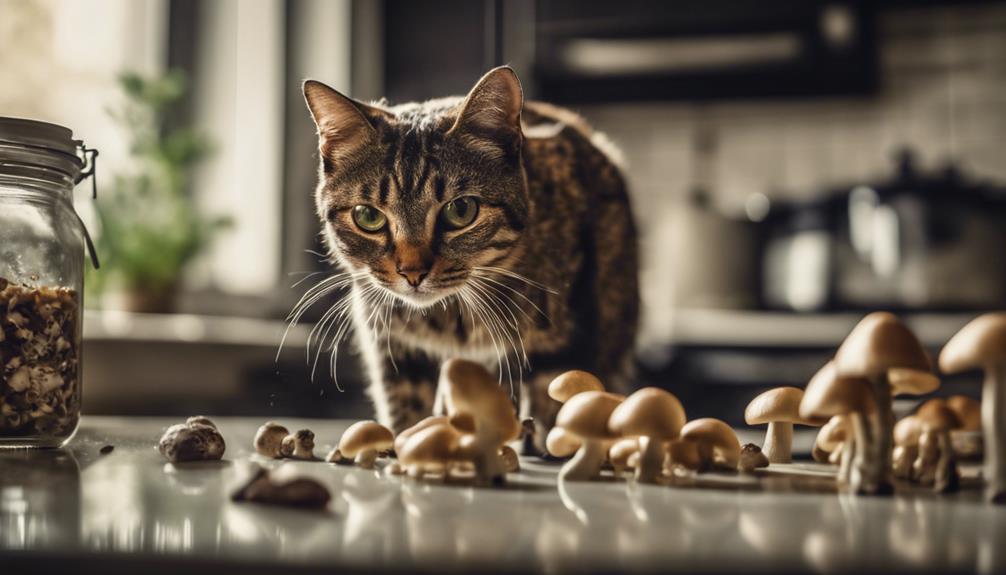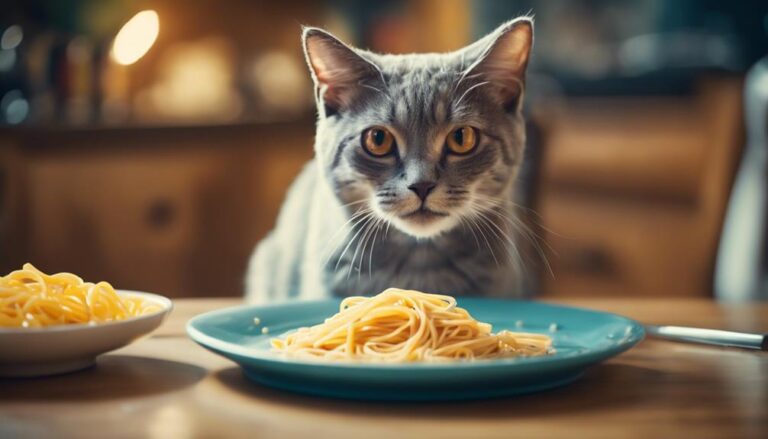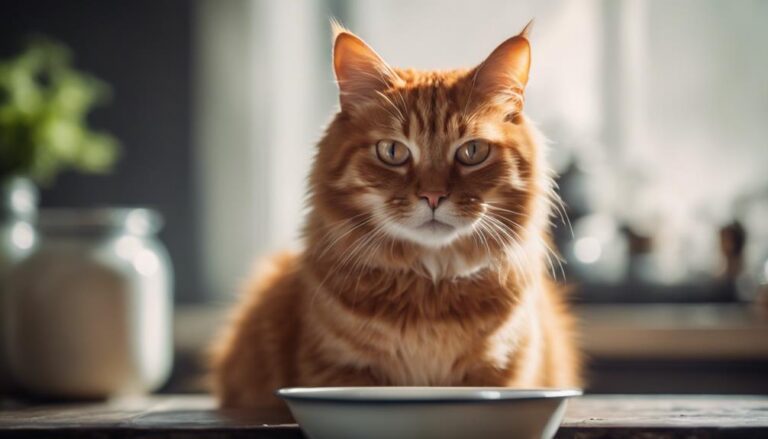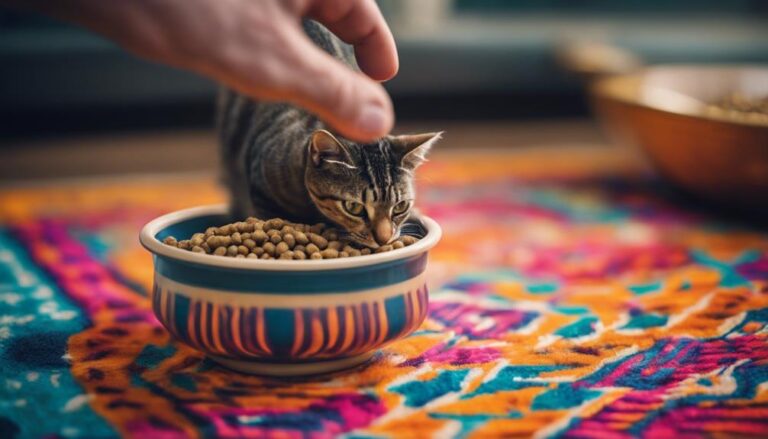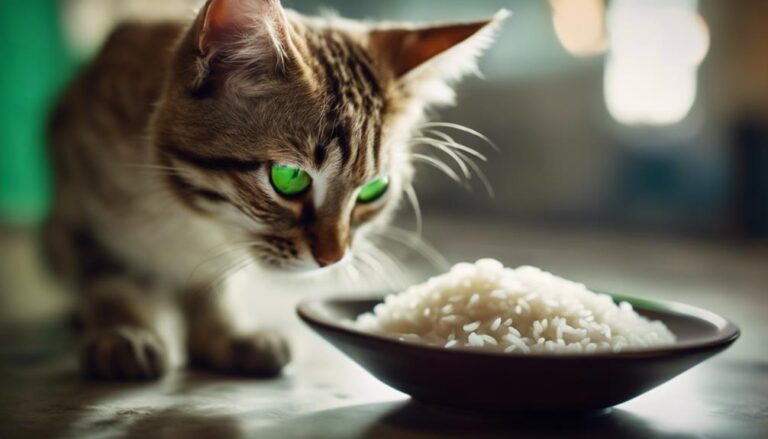If you've ever wondered about the safety of feeding mushrooms to your feline friend, it's essential to consider various factors before offering them this treat. While some mushrooms can be a nutritious addition to your cat's diet, others can be harmful or even toxic. Understanding the nuances between safe and dangerous mushroom types is crucial for ensuring the well-being of your beloved pet. So, before you decide to share your fungi feast with your furry companion, it's vital to know which mushrooms are safe and how to proceed cautiously.
Overview
When considering whether cats can eat mushrooms, it's essential to understand the potential risks and benefits associated with their consumption. While store-bought mushrooms are generally safe for cats, wild mushrooms can be toxic and should be avoided. Feeding your feline friend mushrooms should be occasional and not a significant part of their diet to prevent any adverse reactions.
It's crucial to be aware of which mushrooms are safe and which are poisonous for cats before offering them any. Some mushrooms can provide health benefits for cats, such as immune system support and anti-inflammatory properties. Safe mushroom options for cats include portobello, oyster, and shiitake mushrooms in small amounts. These varieties can be a tasty treat for your cat while also potentially boosting their health in moderation.
Cats' Preference for Mushrooms
Cats are often drawn to mushrooms due to their umami flavor, reminiscent of the taste of meat. This savory taste is appealing to cats like Cashew, possibly because mushrooms contain amino acids that enhance their interest. The umami flavor in mushrooms can entice cats more than other fruits or vegetables, highlighting their preference for protein-rich foods. It's not uncommon to find a cat craving mushrooms due to this unique flavor profile.
Their inclination towards mushrooms showcases a natural desire for nutrients found in these fungi. Next, we'll explore the health benefits of mushrooms for cats, shedding light on whether they're safe for feline consumption.
Health Benefits of Mushrooms
Mushrooms offer your cat a range of health benefits, including essential nutrients for overall well-being, an immune system boost through beta-glucans, and antioxidant properties to combat inflammation.
Incorporating mushrooms into your cat's diet in moderation can provide them with fiber, low-calorie options, and a variety of vital nutrients that contribute to their overall health and vitality.
Enjoy watching your feline friend reap the advantages of safely consuming mushrooms as part of their balanced diet.
Mushroom Nutrients for Health
Indulging your feline friend with mushrooms can provide a substantial boost to their overall health due to the rich nutrients they offer. While some mushrooms are safe for cats and can provide essential amino acids in protein, others can be toxic to cats if consumed.
When feeding your cat mushrooms, it's crucial to stick to varieties that are safe and suitable for feline consumption. The minor health benefits of mushrooms for cats include selenium, vitamin B, and antioxidants that can contribute to their well-being.
Additionally, the beta-glucans found in mushrooms can support your cat's immune system, the fiber content can aid in digestion, and the anti-inflammatory properties can benefit cats with specific health conditions.
Immune System Boost
Boost your cat's immune system naturally with the powerful beta-glucans found in immune-boosting mushrooms. These beta-glucans play a crucial role in enhancing your cat's immune system, aiding in immune function and defense against infections.
Additionally, mushrooms contain anti-inflammatory properties that can help reduce inflammation in your cat, promoting overall health. Certain mushrooms also contain polysaccharides that have been shown to boost immune responses in cats.
Antioxidant Properties
To enhance your cat's overall health, consider incorporating mushrooms into their diet due to their powerful antioxidant properties that can support cellular health and reduce inflammation. Mushrooms contain antioxidants like selenium and ergothioneine, which can boost your cat's immune system and reduce inflammation.
The beta-glucans found in mushrooms have immune-boosting properties that can further benefit your cat's well-being. By including mushrooms in moderation, you can provide your cat with essential nutrients and antioxidant benefits that support their cellular health and protect against oxidative stress.
Prioritizing your cat's diet with mushrooms can contribute to their overall health and help them maintain a strong immune system while reducing the risk of inflammation-related issues.
Safe Quantity for Cats
When considering the safe quantity of mushrooms for your cat, it's crucial to be mindful of their potential toxicity in large amounts. Cats have sensitive digestive systems, so it's best to stick to small portion sizes to avoid any gastrointestinal issues.
Remember to always prioritize your cat's health and consult with a veterinarian for guidance on the appropriate amount of mushrooms to feed them.
Toxicity in Large Amounts
Excessive consumption of mushrooms by cats can result in various health issues due to their potential toxicity levels. Cats are susceptible to toxins found in certain mushrooms, which can lead to gastrointestinal upset and organ damage.
To prevent such risks, it's essential to limit the amount of mushrooms your cat consumes. Safe quantity guidelines for cats when it comes to mushrooms are generally small and occasional.
If you suspect your cat has ingested mushrooms or is showing any signs of distress after consuming them, it's crucial to consult a veterinarian immediately. They can provide guidance on the appropriate actions to take and help determine safe portion sizes for your cat's well-being.
Cats' Digestive Systems
Cats' digestive systems require careful consideration when determining the safe quantity of mushrooms for their diet. Due to their sensitive digestive systems, cats may experience gastrointestinal upset if fed large amounts of mushrooms. It's best to offer mushrooms to cats in moderation as an occasional treat rather than a regular part of their diet.
Cats have unique dietary requirements, and mushrooms may not easily digest in their systems. Therefore, when incorporating mushrooms into a cat's diet, it's essential to do so sparingly to prevent any digestive issues. Remember, moderation is key, and always prioritize their regular cat food to ensure a balanced and healthy diet for your feline friend.
Safe Portion Sizes
To ensure your cat's well-being, consider the safe portion sizes of mushrooms when including them in their diet. While cats can eat mushrooms, it's crucial to be cautious as certain types of mushrooms can affect them negatively. Stick to feeding your cat small amounts of safe mushrooms as an occasional treat to avoid any potential digestive issues.
Remember that poisonous mushrooms can be harmful to your feline friend, so always be aware of the types of mushrooms you offer. Moderation is key; refrain from giving your cat large quantities of mushrooms to prevent gastrointestinal upset. If you have any doubts about the safe portion sizes of mushrooms for your cat, consult a veterinarian for guidance to ensure your pet stays healthy.
Safe Mushroom Types
Safe mushroom types for your feline friend to enjoy include popular store-bought varieties such as portobello, oyster, and shiitake. These mushrooms are safe for your cat to consume and offer a range of benefits like being low in calories, high in fiber, and packed with essential nutrients. Here are some reasons why these mushrooms can be a healthy addition to your cat's diet:
- Low-Calorie: Store-bought mushrooms like portobello, oyster, and shiitake are low in calories, making them a great option for cats watching their weight.
- Fiber-Rich: These mushrooms are fiber-rich, which can support your cat's digestive health and help prevent constipation.
- Nutrient-Dense: Portobello, oyster, and shiitake mushrooms are nutrient-dense, providing vitamins and minerals that contribute to your cat's overall well-being.
- Safe Option: Store-bought mushrooms are free from toxins found in wild mushrooms, ensuring that your cat can enjoy them without any health risks.
Offering these safe mushroom types in moderation can be a tasty and nutritious treat for your beloved pet.
Toxic Mushrooms for Cats
When considering mushrooms for your feline companion, it's crucial to be aware of the potential dangers posed by toxic varieties. Treat all mushrooms not meant for human consumption as toxic for cats, as North America alone harbors over 100 poisonous mushroom species that can be dangerous to your pet.
Symptoms of mushroom ingestion in cats can vary, ranging from gastrointestinal issues to organ failure. If you suspect your cat has ingested a toxic mushroom, immediate veterinary care is essential to address the situation promptly.
Prevention is key in safeguarding your cat's health – ensure they don't come into contact with wild or unknown origin mushrooms to avoid the risks of poisoning. By staying vigilant and proactive in keeping toxic mushrooms away from your feline friend, you can help maintain their well-being and prevent potentially serious health complications.
Frequently Asked Questions
Are Mushrooms Toxic to Cats?
Mushrooms are toxic to cats. Some varieties can cause vomiting, diarrhea, and organ failure. Amanita muscaria and pantherina mushrooms are especially dangerous. Never feed wild mushrooms to cats; it can lead to poisoning and fatal consequences.
Can Cats Eat Mushrooms From Pizza?
Eating mushrooms from pizza can be harmful to cats. They may contain toxic ingredients like onions and garlic. Cheese, dough, and tomato sauce can also cause issues. Stick to cat-friendly treats and consult a vet before sharing food.
Can Cats Have Sauteed Mushrooms?
You can offer plain sauteed mushrooms to your cat as an occasional treat. Avoid using butter, oils, or seasonings. These mushrooms can provide fiber, vitamins, and minerals. Always consult your vet before introducing new foods.
Are Mushrooms and Onions Bad for Cats?
Mushrooms and onions are bad for cats. They can cause gastrointestinal upset and serious health issues. Keep them away from your cat to prevent poisoning. If ingestion occurs, contact a vet immediately for proper care.

